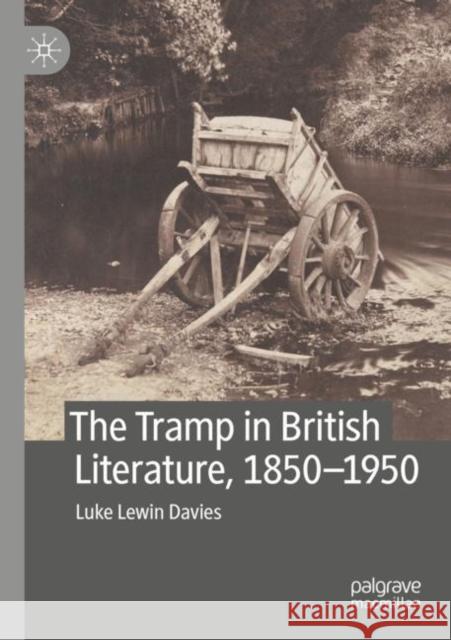The Tramp in British Literature, 1850—1950 » książka
The Tramp in British Literature, 1850—1950
ISBN-13: 9783030734343 / Angielski / Miękka / 2022 / 344 str.
The Tramp in British Literature, 1850—1950
ISBN-13: 9783030734343 / Angielski / Miękka / 2022 / 344 str.
(netto: 460,04 VAT: 5%)
Najniższa cena z 30 dni: 462,63
ok. 22 dni roboczych.
Darmowa dostawa!
Shortlisted for the Literary Encyclopedia Book Prize 2022,The Tramp in British Literature, 1850–1950offers a unique account of the emergence of a new conception of homelessness in the mid-nineteenth century. After arguing that the emergence of the figure of the tramp reflects the evolution of capitalism and disciplinary society in this period,The Tramp in British Literatureuncovers a neglected body of "tramp literature" written by memoir and fiction writers, many of whom were themselves homeless. In analysing these works, it presents select texts as a unique and ignored contribution to a wider radical discourse defined by its opposition to a wider societal preoccupation with the need to be productive. the figure of the tramp reflects the evolution of capitalism and disciplinary society in this period,The Tramp in British Literatureuncovers a neglected body of "tramp literature" written by memoir and fiction writers, many of whom were themselves homeless. In analysing these works, it presents select texts as a unique and ignored contribution to a wider radical discourse defined by its opposition to a wider societal preoccupation with the need to be productive. the figure of the tramp reflects the evolution of capitalism and disciplinary society in this period,The Tramp in British Literatureuncovers a neglected body of "tramp literature" written by memoir and fiction writers, many of whom were themselves homeless. In analysing these works, it presents select texts as a unique and ignored contribution to a wider radical discourse defined by its opposition to a wider societal preoccupation with the need to be productive. the figure of the tramp reflects the evolution of capitalism and disciplinary society in this period,The Tramp in British Literatureuncovers a neglected body of "tramp literature" written by memoir and fiction writers, many of whom were themselves homeless. In analysing these works, it presents select texts as a unique and ignored contribution to a wider radical discourse defined by its opposition to a wider societal preoccupation with the need to be productive. the figure of the tramp reflects the evolution of capitalism and disciplinary society in this period,The Tramp in British Literatureuncovers a neglected body of "tramp literature" written by memoir and fiction writers, many of whom were themselves homeless. In analysing these works, it presents select texts as a unique and ignored contribution to a wider radical discourse defined by its opposition to a wider societal preoccupation with the need to be productive.
Shortlisted for the Literary Encyclopedia Book Prize 2022, The Tramp in British Literature, 1850–1950 offers a unique account of the emergence of a new conception of homelessness in the mid-nineteenth century. After arguing that the emergence of the figure of the tramp reflects the evolution of capitalism and disciplinary society in this period, The Tramp in British Literature uncovers a neglected body of "tramp literature" written by memoir and fiction writers, many of whom were themselves homeless. In analysing these works, it presents select texts as a unique and ignored contribution to a wider radical discourse defined by its opposition to a wider societal preoccupation with the need to be productive. the figure of the tramp reflects the evolution of capitalism and disciplinary society in this period, The Tramp in British Literature uncovers a neglected body of "tramp literature" written by memoir and fiction writers, many of whom were themselves homeless. In analysing these works, it presents select texts as a unique and ignored contribution to a wider radical discourse defined by its opposition to a wider societal preoccupation with the need to be productive. the figure of the tramp reflects the evolution of capitalism and disciplinary society in this period, The Tramp in British Literature uncovers a neglected body of "tramp literature" written by memoir and fiction writers, many of whom were themselves homeless. In analysing these works, it presents select texts as a unique and ignored contribution to a wider radical discourse defined by its opposition to a wider societal preoccupation with the need to be productive. the figure of the tramp reflects the evolution of capitalism and disciplinary society in this period, The Tramp in British Literature uncovers a neglected body of "tramp literature" written by memoir and fiction writers, many of whom were themselves homeless. In analysing these works, it presents select texts as a unique and ignored contribution to a wider radical discourse defined by its opposition to a wider societal preoccupation with the need to be productive. the figure of the tramp reflects the evolution of capitalism and disciplinary society in this period, The Tramp in British Literature uncovers a neglected body of "tramp literature" written by memoir and fiction writers, many of whom were themselves homeless. In analysing these works, it presents select texts as a unique and ignored contribution to a wider radical discourse defined by its opposition to a wider societal preoccupation with the need to be productive.











